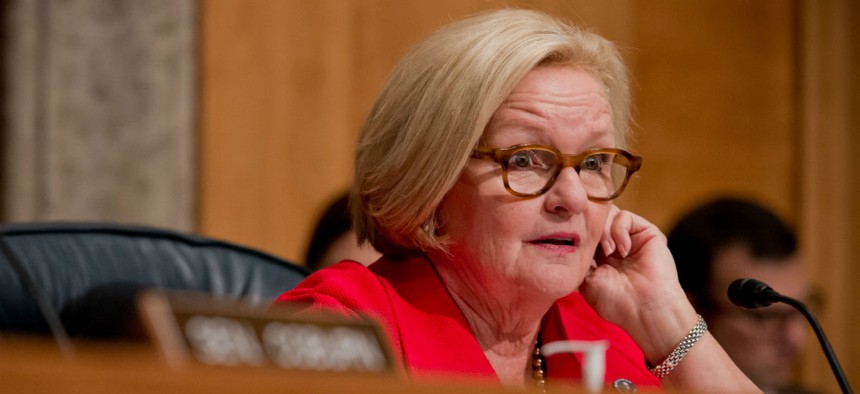
Sen. Claire McCaskill, D-Mo., assigned the report. Flickr user Senator Claire McCaskill
Inspectors General Face Uncertain and Opaque Funding, Senate Report Says
Democratic staffers find Trump budget planners sought cuts even at agencies gaining money in other areas.
Despite a recent law requiring more transparent budgeting, various inspectors general are being targeted for budget cuts by the Trump White House, some of them at agencies the administration proposed for funding hikes, according to a report released Wednesday by Democratic staff on the Senate Homeland Security and Governmental Affairs Committee.
The result, said ranking member Sen. Claire McCaskill, D-Mo., who assigned the study, is ”deeply troubling and hinders the effort to ensure taxpayer dollars are spent appropriately.” Inspectors general “contribute to the important job of curbing waste, fraud and abuse at federal agencies, so it’s unconscionable that we would cut their budgets and decrease accountability,” she added.
Overall in President Trump’s fiscal 2019 budget released in February, IG funding made up a fraction—0.075 percent— of agency-wide finding, the report said. If enacted, for every $1,329 in agency-wide funding, IGs would receive one dollar, the report said.
IGs themselves have long expressed concern about insufficient funding, arguing that collectively they identify $17 in savings for every dollar spent on their operations. As a DHS watchdog wrote, “Substantially reducing the budget of DHS [Office of Inspector General] while increasing the budget and activities of DHS critically impairs the DHS OIG’s ability to carry out its statutory oversight responsibilities.”
The report, based on reviews of 27 agencies, contains a similar statement from Michael Horowitz, who doubles as inspector general at the Justice Department and chairman of the Council of the Inspectors General on Integrity and Efficiency. “I have concluded that the president’s budget request would essentially keep the OIG’s budget flat in fiscal 2018 and fiscal 2019 even as budgets for other department law enforcement components such as the Federal Bureau of Investigation are recommended for increases during that same period,” he said. “The OIG cannot effectively oversee the department’s largest components if their budgets and staff grow disproportionately to ours.”
The report singled out six agency IG offices, including the Homeland Security Department’s, whose budgets would not keep pace with the budgets for their parent agencies, producing a “relative reduction” in IG resources.
The IGs facing the largest percentage cuts in the president’s fiscal 2019 budget were the Special Inspector General for the Troubled Asset Relief Program (57.9 percent); the Agriculture Department (11 percent), the Environmental Protection Agency (8 percent) and Homeland Security (7.2 percent.)
“The inclusion of the IGs’ initial budget estimates in the president’s budget submission gives Congress valuable insight into the needs of the IG community and how the administration is prioritizing resources,” McCaskill’s team acknowledged. “However, the absence of information about most IGs’ initial funding requests significantly limits insight into the budget process.”
Republicans on the Senate panel did not respond to requests for comment. Judiciary Committee Chairman Sen. Chuck Grassley, R-Iowa, who spoke last month at the IGs’ celebration of the 40th anniversary of the law that created the position, encouraged them to focus on Congress’s power of the purse rather than White House proposals.







